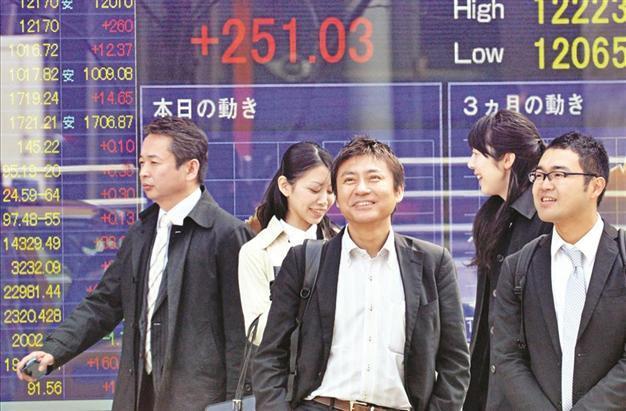Japan’s recession over, now recovery awaited
TOKYO - Agence France-Presse

Pedestrians pass before a share prices board in Tokyo on March 8. Japanese economy expanded 0.2 percent in last quarter of 2012. Despite the growth is modest, it signals a recorvey from two consecutive quarters’ shrinkage. AFP photo
Japan eased out of recession in the last quarter of 2012, with modest growth analysts said on March 8 underpins a strengthening economy, as the government and central bank up their fight against deflation.
The 0.2 percent expansion on an annualised basis in the three months to December will be welcome news for Prime Minister Shinzo Abe, whose first few months in office have seen renewed optimism over the world’s third largest economy.
The economy had shrunk for two consecutive quarters from April through September as export demand weakened on the back of financial turmoil in the key European market, a strong yen and a diplomatic row with China.
Adding to the upbeat sentiment on March 8 was a 2.64 percent surge in the benchmark Nikkei 225 index, taking it to levels not seen since before the 2008 collapse of Lehman Brothers that heralded the global economic crisis.
Abe’s mantra since being swept to power in December has been one of pumping life into a flaccid economy and turning around 15 years of growth-sapping inflation, while announcing huge debt-funded spending packages.
Mixed dataThe country has Seen a mixed bag of economic data lately, with the unemployment rate edging down to 4.2 percent in January and deflation doggedly persisting, while industrial output showed a modest rise of 0.1 percent in January from the previous month.
In January, Japan also posted its third straight deficit in the current account, the broadest measure of trade with the rest of the world, showing it was 364.8 billion yen ($3.8 billion) in the red for the month.
However, the yen has weakened by almost a fifth since November on expectations the Bank of Japan would adopt an aggressive monetary easing policy, helping make the nation’s exporters more competitive and boosting their latest earnings results.
Abe has heaped pressure on the central bank, threatening to change the law guaranteeing its independence if it did not fall into line.
Last month he nominated Asian Development Bank head Haruhiko Kuroda, an advocate of aggressive easing measures, to take the helm at the Bank of Japan, after Masaaki Shirakawa stepped down early following repeated policy clashes with the premier.
Abe also unveiled a massive spending plan in January that he says will boost gross domestic product by two percentage points and create 600,000 jobs.
Japan logged its worst ever monthly trade deficit of 1.63 trillion yen ($17 billion) in January despite an upturn in exports, as the yen’s recent sharp drop pushed fuel costs higher, finance ministry data showed last month.
And the latest ministry data on Friday showed Japan posted a trade deficit of 935.79 billion yen ($9.87 billion) in the first 20 days of February, the gap more than 12 times a 74.49 billion yen deficit in the same period the previous year.
